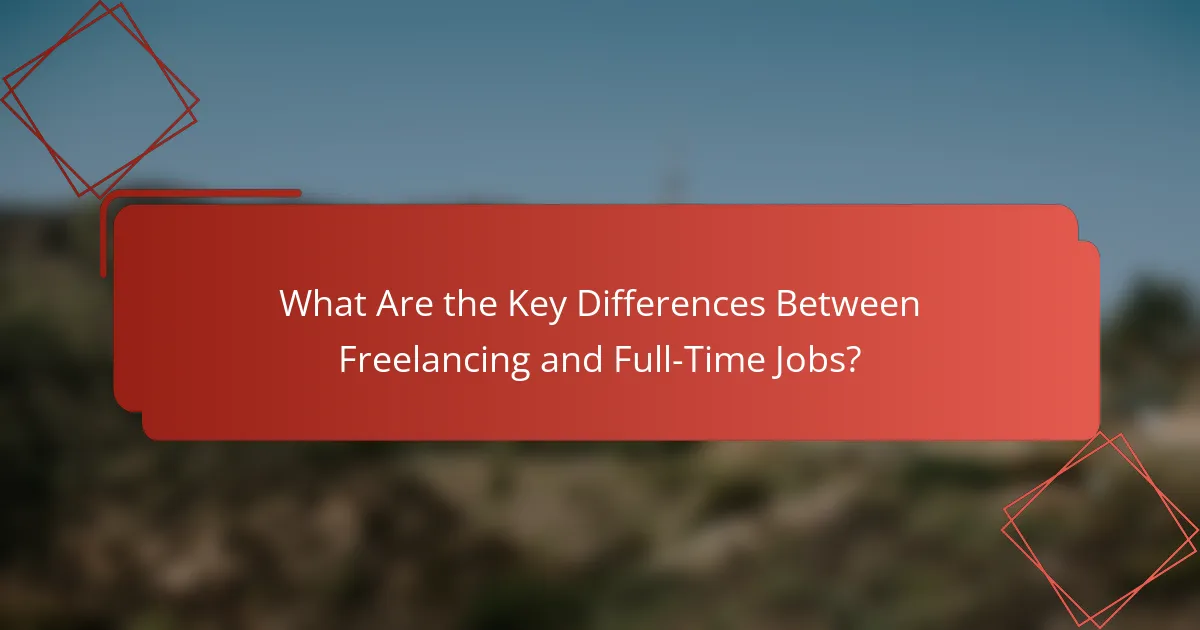Choosing between freelancing and full-time employment involves weighing the benefits of flexibility and autonomy against the stability and benefits of traditional jobs. Freelancing can provide diverse project opportunities and the potential for higher earnings, while full-time positions often offer financial security and career advancement. Understanding your personal and professional goals is essential in determining which path is best for you.

What Are the Advantages of Freelancing?
Freelancing offers several key advantages, including flexibility, a variety of project options, and the potential for higher earnings compared to traditional employment. These benefits can make freelancing an appealing choice for many professionals seeking autonomy in their careers.
Flexible schedule
One of the primary advantages of freelancing is the ability to set your own schedule. Freelancers can choose when and where to work, allowing for a better work-life balance. This flexibility is particularly beneficial for those with family commitments or other personal responsibilities.
However, managing your time effectively is crucial. Freelancers should establish a routine to ensure productivity while still enjoying the freedom that comes with their work. Setting clear boundaries between work and personal time can help maintain this balance.
Diverse project opportunities
Freelancers often have access to a wide range of projects across different industries. This diversity allows individuals to explore various interests and develop new skills. Working on different projects can keep the work engaging and prevent burnout.
To maximize opportunities, freelancers should build a strong portfolio and network within their industry. Online platforms and social media can be effective tools for connecting with potential clients and showcasing your expertise.
Potential for higher income
Freelancing can lead to higher income potential compared to traditional jobs, especially for skilled professionals in high-demand fields. Many freelancers set their rates based on their expertise and the complexity of the projects they undertake, which can result in significant earnings.
However, income can be inconsistent, especially when starting out. Freelancers should consider diversifying their client base and creating multiple income streams to mitigate financial fluctuations. Setting aside savings for lean periods is also advisable to ensure financial stability.

What Are the Advantages of Full-Time Jobs?
Full-time jobs offer several key advantages, including financial stability, comprehensive benefits, and opportunities for career advancement. These factors can significantly impact an individual’s professional life and overall well-being.
Stable income
One of the primary advantages of full-time employment is a stable income. Employees typically receive a consistent paycheck, which allows for better financial planning and budgeting. This predictability can be crucial for managing monthly expenses such as rent, utilities, and groceries.
In contrast to freelancing, where income can fluctuate widely, full-time positions often come with set salaries or hourly wages. This stability can help individuals secure loans or mortgages, as lenders favor applicants with reliable earnings.
Employee benefits
Full-time jobs frequently include a range of employee benefits that enhance overall compensation. Common benefits include health insurance, retirement plans, paid time off, and sometimes bonuses or profit-sharing. These perks can significantly improve an employee’s quality of life and financial security.
For example, health insurance can cover substantial medical expenses, while retirement plans help employees save for the future. Freelancers, on the other hand, must independently manage these aspects, often leading to higher out-of-pocket costs.
Career development opportunities
Full-time positions often provide structured career development opportunities that can lead to promotions and skill enhancement. Many companies invest in employee training programs, mentorship, and continuing education, which can help individuals advance in their careers.
Additionally, being part of a full-time team can facilitate networking and collaboration, opening doors to new projects and roles within the organization. Freelancers may miss out on these growth opportunities, as they typically work independently and may not have access to the same resources or support systems.

When Should You Choose Freelancing?
Freelancing is ideal when you seek autonomy in your work schedule and project selection. It allows you to tailor your career to fit personal needs and market opportunities.
Desire for flexibility
Freelancing offers significant flexibility in terms of work hours and location. You can choose to work from home, a café, or while traveling, and set your own hours to balance personal commitments.
This flexibility can be especially beneficial for parents, students, or anyone with varying schedules. However, it requires strong time management skills to ensure productivity and meet client deadlines.
Need for diverse experiences
Freelancing allows you to work on a variety of projects across different industries, enhancing your skills and broadening your portfolio. This diversity can lead to a more fulfilling career and help you discover your true interests.
For example, a freelance graphic designer might work on branding for a tech startup one week and create marketing materials for a non-profit the next. Such varied experiences can make you more adaptable and marketable.
Market demand for specific skills
If you possess in-demand skills such as web development, digital marketing, or graphic design, freelancing can be a lucrative option. Many businesses seek specialized talent for short-term projects, often offering competitive rates.
Researching platforms like Upwork or Fiverr can help you gauge current market demand and set appropriate pricing for your services. Be prepared to adjust your offerings based on industry trends to maximize your opportunities.

When Should You Choose a Full-Time Job?
Choosing a full-time job is ideal when you prioritize financial stability, a structured work environment, and long-term career development. These factors can significantly influence your job satisfaction and professional growth.
Need for financial stability
A full-time job typically offers a steady income, which is crucial for managing regular expenses like rent, utilities, and groceries. This financial predictability can alleviate stress and allow for better budgeting.
In many cases, full-time positions come with benefits such as health insurance, retirement plans, and paid leave, which can add significant value to your overall compensation. For example, a job offering a salary of $50,000 per year might include benefits worth an additional $10,000, enhancing your financial security.
Preference for structured environment
If you thrive in a structured environment, a full-time job may be more suitable. These roles often come with set hours, defined responsibilities, and clear expectations, which can help you stay organized and focused.
Additionally, working in a team setting can foster collaboration and provide support from colleagues and supervisors. This structure can lead to a more predictable work-life balance, making it easier to plan personal activities around your job commitments.
Long-term career goals
For individuals with specific long-term career aspirations, a full-time job can provide the necessary resources and opportunities for advancement. Many companies offer training programs, mentorship, and clear pathways for promotion that can help you achieve your professional objectives.
Consider how a full-time position aligns with your career trajectory. If you aim to climb the corporate ladder or gain specialized skills, a stable job may offer the best platform for growth, especially in industries that value tenure and experience.

What Are the Key Differences Between Freelancing and Full-Time Jobs?
Freelancing and full-time jobs differ primarily in work structure, income variability, and job security. Freelancers typically enjoy flexible schedules and project-based work, while full-time employees have consistent hours and benefits.
Work structure
Freelancers operate as independent contractors, allowing them to choose their projects and set their own schedules. This flexibility can lead to a better work-life balance, but it also requires self-discipline and effective time management.
In contrast, full-time jobs usually involve a fixed schedule and a defined workplace, which can provide stability and a clear career path. Employees often have set responsibilities and may work in teams, fostering collaboration and support.
Income variability
Freelancers often face income variability, as their earnings depend on the number of clients and projects they secure. This can lead to fluctuating monthly income, making budgeting more challenging. Many freelancers set aside savings to manage lean periods.
Full-time employees typically receive a steady paycheck, which simplifies financial planning. They may also benefit from bonuses, raises, and employer-sponsored benefits, providing a more predictable financial landscape.
Job security
Job security for freelancers can be uncertain, as they must constantly seek new clients and projects. Economic downturns or changes in demand can significantly impact their income and job stability.
Full-time positions generally offer greater job security, with employment protections and benefits such as health insurance and retirement plans. However, layoffs can still occur, especially in volatile industries, so it’s wise for employees to stay informed about their company’s health.

What Criteria Should You Consider When Deciding?
When deciding between freelancing and full-time jobs, consider factors such as income stability, work-life balance, and personal career goals. Each option has distinct advantages and challenges that can impact your lifestyle and financial security.
Income Stability
Income stability is a crucial factor when choosing between freelancing and full-time employment. Full-time jobs typically offer a consistent salary, benefits, and retirement plans, providing financial security. In contrast, freelancers experience variable income, which can fluctuate based on project availability and client payments.
To assess your financial needs, calculate your monthly expenses and compare them with potential freelance earnings. Many freelancers aim to secure a minimum of three to six months’ worth of living expenses saved before fully transitioning from a full-time job.
Work-Life Balance
Work-life balance varies significantly between freelancing and full-time positions. Freelancers often enjoy flexible schedules, allowing them to work when they are most productive or to accommodate personal commitments. However, this flexibility can lead to overworking or difficulty in separating work from personal time.
Full-time jobs usually have set hours, which can help establish boundaries between work and home life. However, they may also come with additional responsibilities and expectations that can encroach on personal time. Consider your preferences for structure versus flexibility when making your decision.
Career Goals
Your career goals play a significant role in determining whether freelancing or full-time employment is the better choice. If you seek diverse experiences and the ability to choose projects, freelancing may align with your aspirations. Freelancers can build a varied portfolio that showcases their skills across different industries.
On the other hand, if you aim for career advancement within a specific field, a full-time job may provide more opportunities for professional development, networking, and mentorship. Evaluate how each option aligns with your long-term objectives and the skills you wish to acquire.
